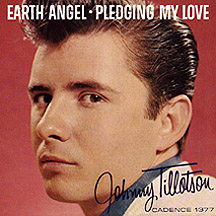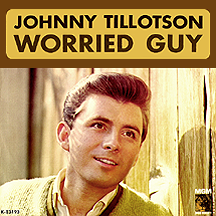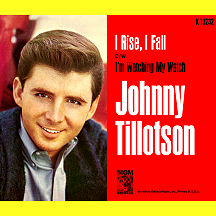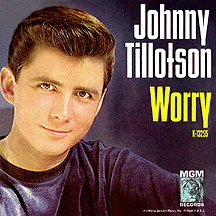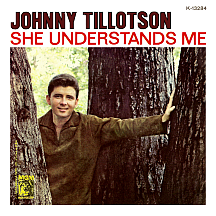JOHNNY TILLOTSON
Usually when a person wants to break into show business he moves to the big city. Johnny Tillotson will tell you it doesn't necessarily have to be that way. He spent most of his childhood in Palatka, Florida, a small town about 60 miles south of Jacksonville, where he was born. Singing and playing ukulele in the Palatka Boys Choir seems to have been all that was needed to put him on track to becoming a popular singer. Johnny worked part time as a country disc jockey on a local radio station and by the time he graduated from high school, everyone in town knew him as "that kid who can sing!"
At that point it seemed necessary to move to the big city after all. So back to Jacksonville he went! Inspired by Elvis Presley's performance on Hank Snow's "All Star Jamboree" when it stopped in Jacksonville May 13, 1955 (several months before Presley's nationwide breakthrough), Johnny stuck his foot in the door at WFGA-TV and became a regular on country singer Toby Dowdy's local show (WFGA, channel 12 in Jacksonville, was the first station to air live coverage of Cape Canaveral's space launches starting in late 1957, relaying the broadcasts at first to NBC's Today Show in New York and later providing coverage to the other networks - and Johnny was there to witness the excitement). He briefly hosted his own show, juggling TV stardom with his studies at the University of Florida in Gainesville.
Country music influenced Tillotson most, but with rock and roll in full swing by '57 he couldn't help but lean in that direction...after all, he was still a teenager! Nashville's Grand Ole Opry held a yearly talent contest sponsored by Pet Milk, which he entered, becoming a finalist. So it was off to the Opry to compete; he didn't win, but music publisher Lee Rosenberg was impressed and arranged an audition with Archie Bleyer, owner of Cadence Records, red hot at the time thanks to those "Bye Bye Love" boys The Everly Brothers. Johnny signed a contract and was ready to join the rock revolution!
So from Palatka he had retraced his steps to Jacksonville, ventured on to Nashville, and then to New York City for his first recording session. Two songs written by Tillotson wound up on his first single release: "Well I'm Your Man" was a rockabilly-flavored number with enough of a pop lean to be a hit; it appeared on the charts in October 1958 but ran its course within a few weeks. The flip side, "Dreamy Eyes," a ballad tailored to teens, rode the charts in November and December, giving an indication of the direction he might take in the near future. Bleyer made an interesting move, releasing two singles simultaneously (on Cadence singles 1353 and 1354), the latter, "I'm Never Gonna Kiss You," credited to Genevieve with Johnny Tillotson. Paris-born songstress Genevieve was in her late thirties at the time, known to TV viewers through numerous appearances on The Tonight Show with Jack Paar. A bubbly little tune written by Al Hoffman, Dick Manning and Breno Ferreira, it was dripping with a European flavor (though with English lyrics) and Johnny's part sounded like an overdubbed vocal aimed at relieving the repetitiousness of the two minute ditty. An interesting and curious piece, one can only guess at what Bleyer's stategy might have been in promoting the song simultaneous with the more mainstream two-sided effort. Genevieve's record disappeared into the abyss of 1958's forgotten recordings.
"True True Happiness," written by Hal Greene, possesses a different kind of strangeness altogether. This third single was his only release in 1959, for reasons unfathomable; Johnny's singing was overshadowed by his enticing spoken passages ('Let me lead you like a steady, take my hand and say you're ready...') and a drawn-out '...yyeeaahhh...' What girl could resist? Charming and a bit creepy at the same time, I'm still amazed it didn't go higher than mid-chart that summer. It's one of the great guilty pleasures of the '50s. Lest I forget, he rocked out on the flip side, "Love is Blind." More musical examples, whatever they may be, were needed to define Johnny's public image.
Clifford Rhodes' "Why Do I Love You So" set 1960 rolling, a midtempo teener that went top ten in a few cities yet fell just short of the national top 40 while being his biggest hit to date. A couple of early rock remakes made up the next single: "Earth Angel" and "Pledging My Love" (number one R&B hits in 1955 for The Penguins and Johnny Ace, respectively) each charted briefly. Achieving marginal results with the NYC-based recordings, Bleyer decided to send Tillotson packing for Nashville to record with some of the city's hottest session musicians, including saxophonist Boots Randolph and pianist Floyd Cramer. Johnny made his big splash on the radio and into permanent pop culture consciousness with the first single to come out of that environment.
"Poetry in Motion" was written by self-professed girl watchers Paul Kaufman and Mike Anthony. Johnny liked the way the song's lyrics portrayed women, "Like putting a mirror up to femininity," as he once said. At any rate, it was a clever contrivance and every musician in the studio was on his game the day it was recorded. A fall '60 blockbuster, it took him to number two in November and went even higher in England, a chart-topper in January '61, establishing a fan base overseas that would lead to many successful tours of Europe and other countries around the globe.
Now a full-fledged teen idol, he scored in 1961 with the Paul Vance-Lee Pockriss song "Jimmy's Girl" and his own dissertation on heartbreak and loneliness, "Without You," a top ten hit in September. A rerelease of "Dreamy Eyes" had a better run on the second try, landing in the top 40 in January '62 at about the time he joined the U.S. Army, which required six months of active duty. Feeling more confident as a songwriter, he and Paul Tannen formed their own music publishing company, Tanridge, under which Johnny's songs were published beginning with the next single. "It Keeps Right on A-Hurtin'" was recorded just before he began service at Fort Jackson, South Carolina. The ballad marked a new direction for the country-bred singer; his third top ten hit on the pop charts, it also gained widespread country airplay, going top ten on that chart as well. He received a Grammy nomination for Best Country and Western Recording, a bit surprising in view of his pop-rock status prior to that time.
A remake of Hank Locklin's 1958 hit "Send Me the Pillow You Dream On" was next, a top 20 single on both the pop and country charts. Then he paid double tribute to childhood favorite Hank Williams with "I Can't Help It (If I'm Still in Love With You)" and "I'm So Lonesome I Could Cry." "Out of My Mind" was a Tillotson original with a country sound, then "You Can Never Stop Me Loving You" crossed country and teen boundaries; written by Jean Slate and Ian Samwell (the latter an original member of the British band that became The Shadows and composer of Cliff Richard's '58 debut hit "Move It"), the song brought Johnny back into the top 20 in September 1963.
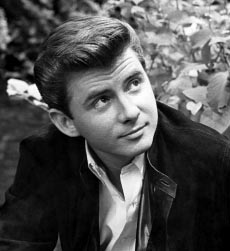
He kept busy that year, co-headlining a tour of England with Del Shannon in April and May (the show also featured The Springfields with future solo star, sister Dusty), during which time they crossed paths with The Beatles, commenting to one another that if these guys ever made it to the States, things could get crazy (so they weren't surprised when that exact thing happened several months later). Johnny performed in the U.K. film Just For Fun alongside Bobby Vee, Freddy Cannon, Ketty Lester and Dusty's aforementioned family folk group. A couple of acting opportunities came along years later: the so-bad-it's-good 1966 cult film The Fat Spy (starring Phyllis Diller, Brian Donlevy and Jayne Mansfield), where he played a character named "Dodo Bronk," and a small part as a guitar player in the 1976 made-for-TV movie The Call of the Wild (one of many adaptations of the classic 1903 novel by Jack London).
With Johnny's Cadence contract winding down, his manager Mel Shayne set up a montetarily advantageous arrangement with MGM Records; he left Cadence for greener pastures just as "You Can Never Stop Me Loving You" was high on the charts. The first single for the new label was John D. Loudermilk's "Talk Back Trembling Lips," a number one country hit for Ernest Ashworth in October. Tillotson's cover expressly targeted the pop market and became his fourth and final top ten hit at the end of December. Other singles for MGM didn't fare as well, but he hit the top 40 at a steady pace over the next couple of years, continuing past even former mentor Archie Bleyer's time in the music business (Bleyer dissolved the Cadence Records operation in September 1964 and sold the label's masters to Andy Williams, who marketed them through his own Barnaby record label).
Tillotson's 1964 and '65 highlights include "Worried Guy," penned by former hitmaker Paul Evans with Jack Reardon, and actor-singer-songwriter Paul Hampton's "I Rise, I Fall." "She Understands Me," composed by Merle Kilgore and Margaret Singleton, was his second biggest MGM hit in late 1964 and was also a top 40 hit for Bobby Vinton in the spring of '66 as "Dum-De-Da." Another Grammy nomination came Johnny's way in 1965 (this time in the short-lived, doomed-to-be-deleted Contemporary Rock and Roll Vocal Performance, Male category) for Harlan Howard's "Heartaches By the Number," which had been a country hit for Ray Price and number one pop smash for Guy Mitchell in 1959.
He has one bona fide TV theme on his resumé: Howard Greenfield and Jack Keller's "(Wait 'Til You See) My Gidget," from the NBC series Gidget, which casually and comically introduced longstanding star Sally Field to the world. After that, Johnny Tillotson concentrated more on writing and recording country music, making some noise in late 1967 with a remake of the Bobby Edwards hit from '61, "You're the Reason." In the late '60s he moved to California and became a regular fixture in nightclubs, at state fairs and rodeos and in the lounges of Las Vegas, Reno and Lake Tahoe, opening shows for Fats Domino, Jackie Wilson and other acts from his, and their, heyday of the late '50s and early '60s.
NOTABLE SINGLES:
- Well I'm Your Man /
Dreamy Eyes - 1958 - I'm Never Gonna Kiss You - 1958
by Genevieve with Johnny Tillotson - True True Happiness /
Love is Blind - 1959 - Why Do I Love You So - 1960
- Earth Angel /
Pledging My Love - 1960 - Poetry in Motion - 1960
- Jimmy's Girl - 1961
- Without You - 1961
- Dreamy Eyes - 1962
- It Keeps Right on A-Hurtin' - 1962
- Send Me the Pillow You Dream On /
What'll I Do - 1962 - I Can't Help It (If I'm Still in Love With You) /
I'm So Lonesome I Could Cry - 1962 - Out of My Mind - 1963
- You Can Never Stop Me Loving You - 1963
- Funny How Time Slips Away - 1963
- Talk Back Trembling Lips - 1963
- Worried Guy - 1964
- I Rise, I Fall - 1964
- Worry - 1964
- She Understands Me - 1964
- Angel - 1965
- Then I'll Count Again - 1965
- Heartaches By the Number - 1965
- Our World /
(Wait 'Til You See) My Gidget - 1965 - You're the Reason - 1967


